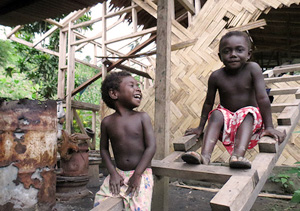
The Carteret Islands are a ring of six atolls 50 miles off the coast of Papua New Guinea. The islands will soon be underwater as rising sea levels will leave them submerged within five years. 3000 inhabitants must leave. The Carterret Islanders are being slowly relocated to Tinputz parish, on Bougainville. The Catholic Church has made diocesan land available. The families being relocated receive a plot of hand for their new home and an area to start farming. So far less than 10 have made the move. Meanwhile, on the islands, conditions are worsening as food runs out and high tides wash away more land each year.
Credits: Nicholson/Caritas
Droughts across West Africa, storms smashing into North America and the Caribbean, glaciers melting faster than imagined: the impact of bad and unusual weather patterns were clearly visible in 2012.
But what was less clear was the political and public will to make the sacrifices necessary to address the driving forces behind climate change and its impact on the poor and vulnerable.
The UN Climate Change Conference is meeting once more, this time in Doha, Qatar 26 November -7 December.
Caritas believes 2012 is an important year in these negotiations. Government must build on some of the breakthroughs made at the Durban conference held this time last year. They must come up with concrete proposals on greater cuts in Green House Gas emissions, money to support vulnerable communities most affected by climate change and a clear work plan towards a global climate deal in 2015. Read our statement paper
The Caritas confederation of Catholic aid agencies under the authority of the Pope believes in climate justice. This means most affected by climate change impacts have access to the finances, knowledge and technology resources required for adaptation and mitigation.
The Caritas team in Doha includes Adriana Opromolla from the Caritas Internationals General Secretariat, Eleazar Gomes from Caritas Asia, Dr Haridas Varikkottil Raman from Caritas India, Tegshbayar Sanduijav from Caritas Mongolia and Stephen Kituku from Caritas Kenya.
Follow our coverage:
|
